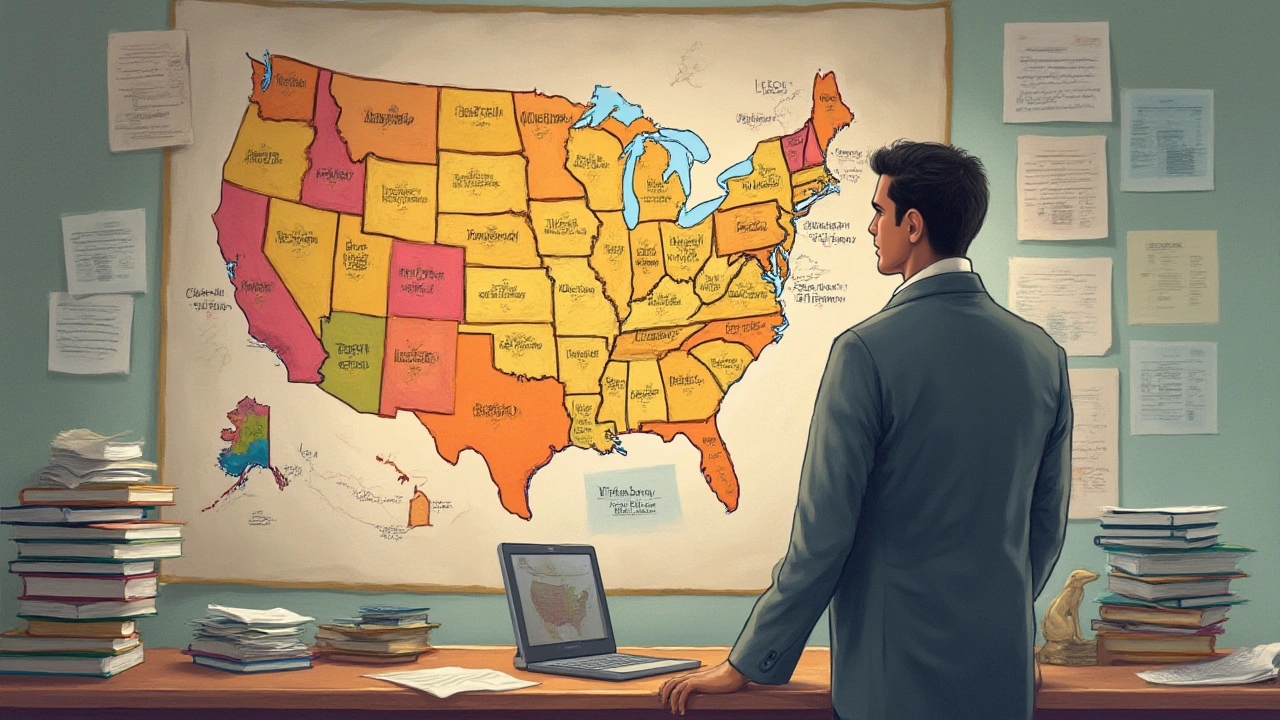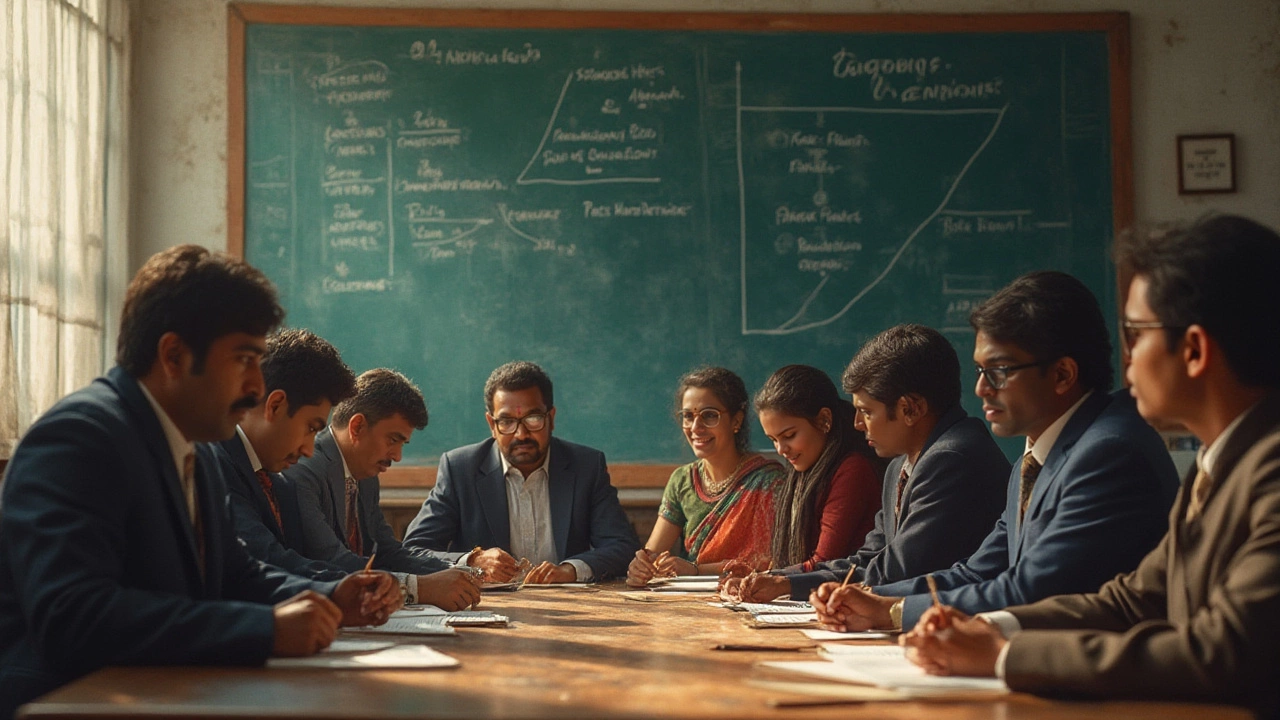
For anyone dreaming of wearing that sharp suit, carrying a leather briefcase, doing courtroom battles, and maybe tossing out a dramatic "Objection!" or two, one question comes up real fast: where’s the toughest place in America to actually become a lawyer? With more than 1.3 million lawyers in the country and each state making its own rules, there’s a dramatic range in how hard it is to turn that dream into reality. While the actual law school grind can feel never-ending, most law grads agree—the most stressful, make-or-break moment is passing the bar exam. But which state really dishes out the biggest legal gauntlet?
The Bar Exam: Why Some States Are Infamously Harder
The bar exam is the test that stands between you and a law license. Some states, like Wisconsin, actually skip it for their own law school grads (if you can believe that), but most make you sweat through two or sometimes three brutal days testing everything from basic contracts to obscure criminal code. Not all bar exams are created equal, though. There's the notorious California bar—famous for three full days of essay, multiple choice, and performance tests, and equally famous for tripping up even the most prepared candidates. New York, Texas, and Florida each come with their own stories of high achievers being humbled. But why is there such a gap in difficulty from one state to the next?
First up: pass rates. States with low pass rates usually have more demanding exams or stricter exam grading. Check this out:
| State | 2024 Bar Exam Pass Rate (%) |
|---|---|
| California | 44.7 |
| Arkansas | 70.9 |
| New York | 62.1 |
| Florida | 60.3 |
| North Dakota | 79.7 |
Those stats tell the story. While North Dakota lets nearly 8 out of 10 test takers pass, California puts as many as half out of the running at the first attempt. The content of the test is another huge factor—it’s not just about the questions, but the breadth. California's bar covers more topic areas than most other states, piling on stress. Florida and New York also ask questions about their unique state laws in crazy detail—good luck winging it there. And then there’s grading—California famously sets a higher minimum score than almost any other place (1440 vs. the typical 1350 out of 2000 possible points on the Uniform Bar Exam, or UBE for short). No wonder some call it the "Mount Everest of bar exams."
We can’t ignore the Uniform Bar Exam (UBE) either. Since its introduction, 41 jurisdictions have adopted the UBE, so scores can be transferred between those states. But California, Florida, and a handful of others haven’t jumped on board, insisting on their own homegrown exam format, which means more work and trickier preparation since you can’t re-use your pass score if you fail in one place but pass in another.
The testing itself isn’t the whole challenge—some states also demand extra essays, performance tests, or a grueling state-specific component. New York, for instance, adds a separate state law section (the New York Law Exam, or NYLE) on top of the UBE, and California throws in performance tests designed to mimic real legal problems lawyers face. These aren’t mere check-the-box questions either—you’re expected to analyze, argue, and draft just like in the real world.
And here’s something that often surprises newbies: certain states add a separate Professional Responsibility exam (the MPRE), ask for background checks, and sometimes require extra coursework post-bar. California famously enforces a fitness and background review, checking not just your legal skills but also your character and honesty. If you’ve had brushes with the law or have unresolved debt, you could be blocked from being licensed—even if you ace the actual test.

What Makes California the Toughest State—and Who Gives It a Run for Its Money?
Bring up the “hardest state bar exam” among law students and it’s almost a meme—California wins the vote again and again. But really, what makes California’s process so rough and is it alone at the top?
The pass rate is the number one factor. In July 2024, California’s overall pass rate was just below 45%. That's not bad luck—it’s by policy. They’ve kept the required score high, chosen to write their own complex essay questions, and test for more subjects than most other states. Even seasoned lawyers who dare to take the test after practicing elsewhere report getting tripped up by California’s detailed questions. The California bar throws in five essays, a “performance test,” and the infamous Multistate Bar Exam (MBE), all in just two days. For a while, it used to be three days long, but even dropping a day didn’t make it much easier. They just managed to cram more work into less time.
Why are the essays especially difficult? They require not only repeating the law, but applying it creatively to new facts—a skill some law schools don’t emphasize if you’re not studying in California. There’s also almost no “fluff” allowed in responses. Graders are hard-nosed about precision, specific language, and tight organization—plus, you’re racing against the clock the whole way. The performance test is another curveball, demanding you draft real legal documents on the fly, with only a pile of imaginary evidence and client correspondence to go by.
But California is not alone in making would-be lawyers sweat. Florida’s exam is legendary for deep dives into topics like property, torts, Florida-specific family law, and professional conduct. The pass rate hovers near 60%, and prepping for state-specific questions can eat up months. New York, now a UBE state, still requires the state law exam (NYLE) and a skills course. Texas, before switching to the UBE in 2021, had a fearsome reputation with low pass rates and detailed, local issue testing favored by seasoned locals over out-of-staters.
Louisiana also stands out—but for different reasons. Louisiana’s law comes from French and Spanish sources as well as American, rather than the common law base used everywhere else. So their exam is almost a language of its own, demanding nine separate essays over three days. You can be a whiz at contracts and torts, but if you don’t “talk Louisiana,” you’ll flunk. It’s no shock many lawyers who move to Louisiana choose not to practice law there, instead working in academia or business. Alaska, while less notorious for its exam, requires applicants to pass a separate Alaska law course and has a small, tight legal community—making the moral character review that much more intense.
And then there’s the wild card: the character and fitness investigation. Every state checks to make sure you have no “moral turpitude” (yes, that’s the actual term) and aren’t hiding any nasty surprises in your past. California, Florida, and Texas are strictest. Expect months of paperwork, interviews, and fingerprinting. More than one would-be lawyer has lost their shot at the very end because of undisclosed traffic tickets or money issues. So, even if you study your heart out, you can’t neglect the paperwork and background check.

Smart Tips and Surprising Strategies to Survive the Toughest Bar Exams
If all this sounds a bit discouraging, don’t lose hope—people do survive, even thrive, after the nation’s hardest bar exams. But success never comes by just crossing your fingers and skimming through flashcards the week before. Beating the California or any state’s tough bar means a game plan smarter than just nose-in-the-book all-nighters.
First tip: Start early. The most successful candidates begin preparing three to four months out, using a study schedule mapped out in detail. This isn’t just about memorizing reams of legal rules. You need to do practice essays, suffer through timed simulated exams, and work with accountability buddies who keep you from slacking off.
It’s tempting to do just what you did in law school—cram case law, collect notecards, maybe binge-read thick outlines. But bar graders in tough states like California aren’t impressed by how many facts you know. They care about how quickly and clearly you can apply that knowledge. So, pick programs or mentors who focus on real exam skills—writing, organization, and answering what’s asked. For the California bar, for example, it’s key to master the performance test format. You’ll want to practice reading tons of new info fast, pulling out only what’s important, and then writing legal documents that stay laser-focused under strict time. Practice doing old state essays (tons are online for free), and have someone who knows the ropes review your work. Honest feedback, not just rote answers, is gold.
Ready for a controversial (but true) strategy? Sometimes, less is more. Focus on the hardest, most commonly tested subjects, and get those nearly perfect. Don’t spread yourself too thin trying to memorize everything. For California and New York, that often means spending the bulk of your time on Evidence, Contracts, and Torts. There’s a method to this madness: when you nail the questions that are worth the most points and appear most often, you boost your odds more than just knowing every footnote in Family Law. Track which questions you miss, and redo them until you can write a solid essay with your eyes closed.
One tip most skip—take care of your mental and physical health. The stress of bar prep, especially in tough states, is a marathon. Not sleeping, living on energy drinks, or isolating yourself for months doesn’t impress the examiners. Many successful lawyers from states like California, Florida, and New York swear by exercise, mindful breaks, and staying social, at least a little, to keep from burning out. If you stumble or get a bad practice score two weeks before the real thing, don’t panic—track your progress with real data, not just feelings.
If you have to juggle a legal job or family while studying, give yourself double the time. Many repeat test takers in California, especially, are already working. If you can afford it, take bar leave or cut your job hours for the six to eight weeks before the exam. Also, be smart about the "character and fitness" portion. Order your criminal history early, gather tiny details (dates, payments, names), and run everything by a colleague if you’re not sure about disclosure. Getting tripped up on paperwork instead of the exam is just tragic after all that work!
If you’re moving between states—say, with a spouse in the military, or looking for better job options—remember that some states, like California and Florida, don’t let you simply re-use your hard-earned bar pass from another state. You’ll need to take their full exam. States that use the UBE, like New York and Texas now, let you transfer scores, making your life way easier. If giving yourself the best shot matters more than the prestige, picking a UBE state or somewhere with high pass rates (Montana, North Dakota, Minnesota) could save you years of stress.
Ready for an underdog story? In 2024, data from the National Conference of Bar Examiners showed almost 18,000 candidates passed the UBE and transferred scores to new states—a lifeline for many who didn’t want to deal with California’s or Louisiana’s brutal exam twice. Sometimes, the “hardest state” is simply the one where you try to go cold turkey, without friends, mentors, or local bar courses. People who find a tight-knit study group almost always outperform solo studiers, even if they weren’t the star in law school.
Yes, it’s intimidating—but every year, thousands survive and move on to real legal careers, courtroom drama and all. Keep your eye on the stats, tailor your study strategy, and never be afraid to ask for help when things get rough. For the determined, there’s always a way to crack the code—even in the toughest state around.
